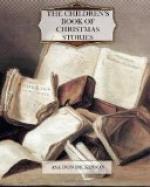“Ch’is’mus, Ch’is’mus, Ch’is’mus!” reiterated Minna continuing to pound.
“Hush, dear! You’ll wake Aunt Arna, and she’s feed after being all day on the chou-chou cars.”
“Merry Ch’is’mus, Aunty Arna!” shouted the irrepressible Minna.
“Oh, darling, be quiet! We’ll play little pig goes to market. I’ll tell you a story, only be quiet a little while.”
It took Peggy’s utmost effort to keep the little wriggler still for the hour from five to six. Then, however, her shrill, “Merry Ch’is’mus!” roused the household. Protests were of no avail. Minna was the only granddaughter. Dark as it was, people must get up.
Peggy must dress Minna and then hurry down to help get breakfast—not so easy a task with Minna ever at one’s heels. The quick-moving sprite seemed to be everywhere—into the sugar-bowl, the cooky jar, the steaming teakettle—before one could turn about. Urged on by the impatient little girl, the grown-ups made short work of breakfast.
After the meal, according to time-honoured Brower custom, they formed in procession, single file, Minna first, then Ben with Baby Robin. They each held aloft a sprig of holly, and they all kept time as they sang, “God rest you, merry gentlemen,” in their march from the dining-room to the office. And there they must form in circle about the tree, and dance three times round, singing “The Christmas-tree is an evergreen,” before they could touch a single present.
The presents are done up according to custom, packages of every shape and size, but all in white paper and tied with red ribbon, and all marked for somebody with somebody else’s best love. They all fall to opening, and the babies’ shouts are not the only ones to be heard.
Passers-by smile indulgently at the racket, remembering that all the Browers are home for Christmas, and the Browers were ever a jovial company.
Peggy gazes at her gifts quietly, but with shining eyes—little gold cuff pins from Hazen, just like Arna’s; a set of furs from Mabel and Ben; but she likes Arna’s gift best of all, a complete set of her favourite author.
But much as they would like to linger about the Christmas tree, Peggy and her mother, at least, must remember that the dishes must be washed and the beds made, and that the family must get ready for church. Peggy does not go to church, and nobody dreams how much she wants to go. She loves the Christmas music. No hymn rings so with joy as:
Jerusalem triumphs, Messiah is king.
The choir sings it only once a year, on the Christmas morning. Besides, her chum Esther will be at church, and Peggy has been too busy to go to see her since she came home from boarding-school for the holidays. But somebody must stay at home, and that somebody who but Peggy? Somebody must baste the turkey and prepare the vegetables and take care of the babies.
Peggy is surprised to find how difficult it is to combine dinner-getting with baby-tending. When she opens the oven-door, there is Minna’s head thrust up under her arm, the inquisitive little nose in great danger by reason of sputtering gravy.




